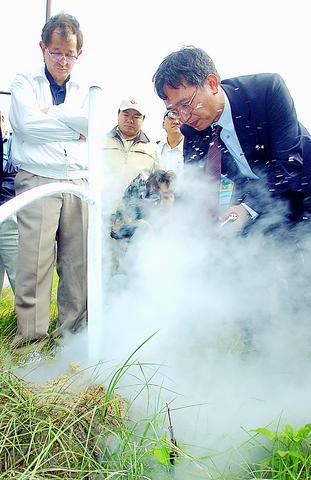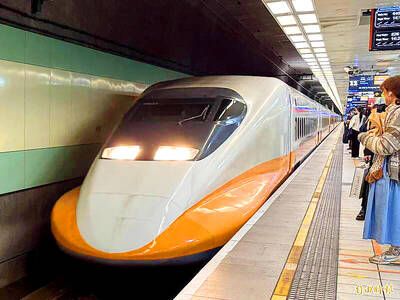Freezing South American red fire ants in liquid nitrogen could be the most effective and most environmental friendly method to eradicate the species, scientists at Academia Sinica said yesterday.
The ants, which have cause the irrational fear among many Taiwanese people after they were discovered recently, have been the target of a government-funded eradication plan. Authorities have spent enormous sums money to tackle the infestation.

Two weeks ago, Academia Sinica President Lee Yuan-tseh (李遠哲) promised legislators that the nation's leading scientists would soon come up with an effective method to destroy the species, such as using liquid nitrogen to freeze the ants to death. At a press conference yesterday in Taipei, Lee said that liquid nitrogen's capacity to kill the ants has been convincingly demonstrated by physicists, zoologists and other researchers.
Over the last two weeks, Chen Yang-yuan (陳洋元), a research fellow at Academia Sinica's Institute of Physics has used liquid nitrogen to freeze red fire ant colonies on the campus of National Taipei University in Sansia, Taipei County.
"The species can't survive at temperatures lower than -17?C. They were all killed immediately after being exposed to liquid nitrogen, which cools things down to -196?C," Chen said.
To help make liquid nitrogen usable in killing ants, scientists have designed reusable iron tubes which cost only NT$150. When liquid nitrogen is injected into an ant colony, it will flow underground through the ants' tunnels, Chen said.
"Five minutes' worth of exposure to liquid nitrogen kills all ants inside a colony," Chen said.
Chen also said that the method would cause no harm to the environment because liquid nitrogen vaporizes and returns to the air.
After analyzing destroyed colonies, William Can-jen Maa (馬堪津), a research fellow at Academia Sinica's Institute of Zoology said all ants, including adults and larva, were killed by the nitrogen.
Maa said that about 24 hours after treating a colony certain types insects and other parasites began occupying the series of ant tunnels.
"Four or five days after the treatment, the ant hills of destroyed colonies will become fertilizer which can be used by other creatures," Maa said.
In addition to liquid nitrogen, Maa suggested using other environmental-friendly methods to tackle the problem of multiple queens that sometimes exist in a large ant colony.
"Originally in South America, there's one queen for each ant colony. Several decades after the fire ants migrated to the US, it is now observed that several queens can co-exist in an anthill," Maa said
Lin Chung-chi (林宗岐), an ant expert at the department of entomology at National Taiwan University, said that the conventional method of eradicating ants by using toxic chemicals might be replaced by liquid nitrogen because the negative impact it made on the ecosystem was limited.
However, cost is an issue. Using liquid nitrogen to destroy a single ant colony costs about NT$600 and leaves no environmental pollution. Using toxic pesticides costs only NT$10, but environmental pollution is a concern.
Tomorrow, the national fire ant task force will be launched to effectively control fire ants.
Yang Ping-shih (楊平世), a professor of entomology at National Taiwan University and head of the task force said yesterday he would probably use liquid nitrogen against fire ants on university campuses. So far, there have been more than 40 schools affected by fire ants.
Shao Kwang-tsao (邵廣昭), a zoologist at Academia Sinica's Research Center for Biodiversity, said that other methods involving ozone, infrared rays and could be used by the task force in near future.

The inspection equipment and data transmission system for new robotic dogs that Taipei is planning to use for sidewalk patrols were developed by a Taiwanese company, the city’s New Construction Office said today, dismissing concerns that the China-made robots could pose a security risk. The city is bringing in smart robotic dogs to help with sidewalk inspections, Taipei Deputy Mayor Lee Ssu-chuan (李四川) said on Facebook. Equipped with a panoramic surveillance system, the robots would be able to automatically flag problems and easily navigate narrow sidewalks, making inspections faster and more accurate, Lee said. By collecting more accurate data, they would help Taipei

TAKING STOCK: The USMC is rebuilding a once-abandoned airfield in Palau to support large-scale ground operations as China’s missile range grows, Naval News reported The US Marine Corps (USMC) is considering new sites for stockpiling equipment in the West Pacific to harden military supply chains and enhance mobility across the Indo-Pacific region, US-based Naval News reported on Saturday. The proposed sites in Palau — one of Taiwan’s diplomatic allies — and Australia would enable a “rapid standup of stored equipment within a year” of the program’s approval, the report said, citing documents published by the USMC last month. In Palau, the service is rebuilding a formerly abandoned World War II-era airfield and establishing ancillary structures to support large-scale ground operations “as China’s missile range and magazine

A 72-year-old man in Kaohsiung was sentenced to 40 days in jail after he was found having sex with a 67-year-old woman under a slide in a public park on Sunday afternoon. At 3pm on Sunday, a mother surnamed Liang (梁) was with her child at a neighborhood park when they found the man, surnamed Tsai (蔡), and woman, surnamed Huang (黃), underneath the slide. Liang took her child away from the scene, took photographs of the two and called the police, who arrived and arrested the couple. During questioning, Tsai told police that he had met Huang that day and offered to

BETTER SERVICE QUALITY: From Nov. 10, tickets with reserved seats would only be valid for the date, train and route specified on the ticket, THSRC said Starting on Nov. 10, high-speed rail passengers with reserved seats would be required to exchange their tickets to board an earlier train. Passengers with reserved seats on a specific train are currently allowed to board earlier trains on the same day and sit in non-reserved cars, but as this is happening increasingly often, and affecting quality of travel and ticket sales, Taiwan High-Speed Rail Corp (THSRC) announced that it would be canceling the policy on Nov. 10. It is one of several new measures launched by THSRC chairman Shih Che (史哲) to improve the quality of service, it said. The company also said